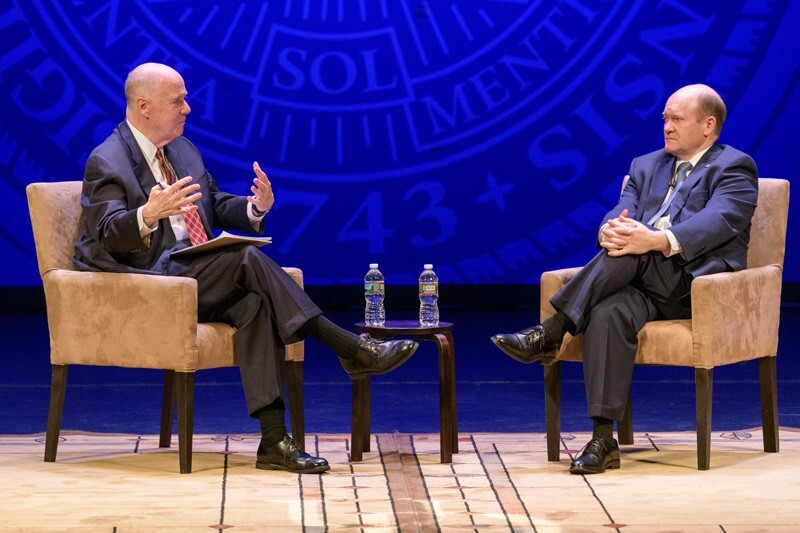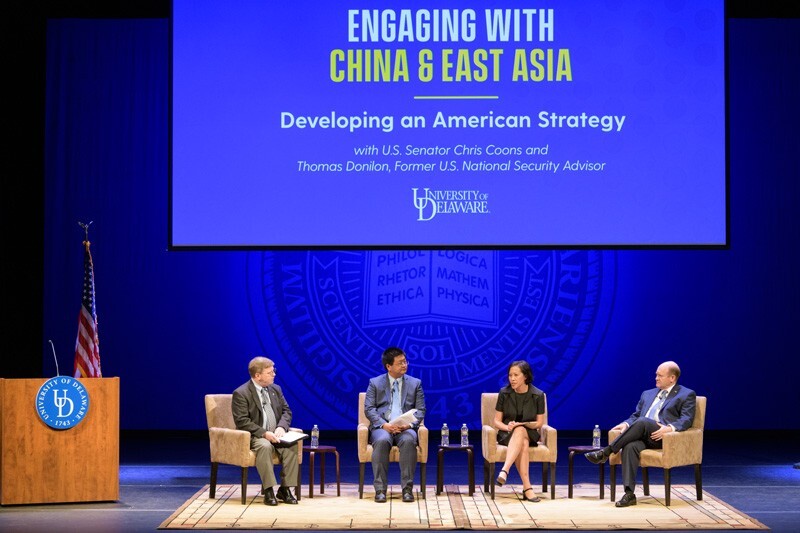us china relations donilon : US-China relations
Senator, former national security adviser meet at UD for policy discussion

Thomas Donilon, former U.S. national security adviser, joined Delaware U.S. Sen. Chris Coons for a discussion May 6 at Mitchell Hall on the University of Delaware campus, part of an event titled, “China and East Asia Policy for the 21st Century.”
Donilon said the turbulent and ongoing trade negotiations between the United States and China highlight the need to rethink U.S. strategy.
“I think U.S.-China relations will be the most important challenge for U.S. diplomats and policy makers as far as the eye can see,” Donilon said. “It’s the most important relationship in the world given the geopolitical, the military and the economic interactions.”
Hosted by UD’s Center for Political Communication and the Department of Political Science and International Relations, the 90-minute event featured two panels on the topic. Prior to the discussion with Donilon, Coons joined a panel that included Alice Ba, professor in the Department of Political Science and International Relations, and Yuanchong Wang, assistant professor in the Department of history. David Redlawsk, James R. Soles Professor and chair of the Department of Political Science and International Relations, served as the panel’s moderator.
Adding to Donilon’s comments, Coons said the current situation with China is a Sputnik moment. On Oct. 4, 1957, the Soviet Union launched Sputnik I, the world’s first artificial satellite to orbit the Earth. The successful launch and orbit stunned many Americans and marked the start of the space race between the United States and the Soviet Union.

“It’s a moment where we look and realize that we have a competitor that is ahead of us,” Coons said. “I think the most important piece of the Sputnik moment that I”m trying to reference is that we significantly increased investments in the United States – in our own research abilities, in our own education – and American public education was refocused on being competitive in the space age.”
That last part should be our goal, Coons added. When the astronauts from the Apollo 11 launch made it to the moon, they left medals to honor U.S. and Russian astronauts who lost their lives in developing rockets and related technology. It was a symbol of healthy competition, which is the direction the United States needs to go with China, Coons said.
While much of their conversation focused on the current concerns, Donilon and Coons emphasized the importance of looking to the future.
“We need to stop thinking about the rise of China and China as a future competitor,” Coons said. “They are here. They have arrived.”
China has a very rich and complex history that Americans must better understand and put in proper context to make smarter foreign policy decisions, Donilon said. However, he said, the U.S. also needs to make an effort.
“The piece that nobody’s really discussing is we have discussions about China, focused on trade, and we”re really hyper focused on trying to change their conduct,” Donilon said. “We want to ask ourselves, “What do we need to do?? That seems to me, Senator, to be the missing piece of the China strategy thus far. What is the United States going to do to meet the competition??
Article by Carlett Spike; photos by Evan Krape
